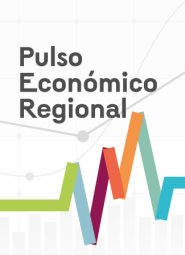Borradores de Economía - Climate Transition Risks and Bank Lending: Evidence from Colombia
The series Working Papers on Economics is published by the Office for Economic Studies at the Banco de la República (Central Bank of Colombia). It contributes to the dissemination and promotion of the work by researchers from the institution. This series is indexed at Research Papers in Economics (RePEc).
On multiple occasions, these works have been the result of collaborative work with individuals from other national or international institutions. The works published are provisional, and their authors are fully responsible for the opinions expressed in them, as well as for possible mistakes. The opinions expressed herein are those of the authors and do not necessarily reflect the views of Banco de la República or its Board of Directors.
The series Working Papers on Economics contributes to the dissemination and promotion of the work by researchers from the institution. On multiple occasions, these works have been the result of collaborative work with individuals from other national or international institutions. This series is indexed at Research Papers in Economics (RePEc). The opinions contained in this document are the sole responsibility of the author and do not commit Banco de la República or its Board of Directors.
Abstract
How is bank lending to fossil fuel firms affected when risks of stranded assets increase? Using loan-level data from the credit registry of the Colombian Superintendency of Finance, we examine how the introduction of the Paris agreement has affected lending to fossil firms, in a country highly dependent on them. We find evidence that the increased risk of stranded assets implied by the Paris agreement led to a 46\% decrease in bank credit to fossil firms. However, banks have become more selective and have prioritised lending to large and well capitalised fossil firms. Additionally, there is suggestive evidence that "brown" banks (i.e., banks with large lending to fossil fuel firms) have become more selective with their clients: they decreased the size of loans to both fossil and non-fossil clients (-87%), whilst increasing the cost of loans to all clients (via an interest rate of 2.15 percentage point higher), but keeping on lending to large fossil fuel firms (+14.8%).
The increase in stranded asset risk, as implied by the Paris Agreement, correlates with a 46% decrease in bank credit to fossil fuel companies relative to other economic sectors.





























































